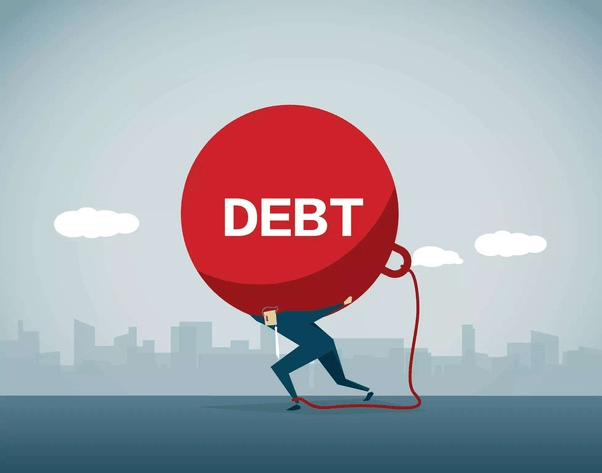Your Debt-Free Journey Starts Here: Insider Secrets
on How to Get Out of Debt!

Understanding Debt and Its Impact on Your Life
Debt is a burden that many of us carry, and it can have a significant impact on our lives. Whether it’s credit card debt, student loans, or a mortgage, debt can feel overwhelming and suffocating. Understanding the psychology of debt is the first step to getting out of it. Debt affects our decision-making processes in various ways. It can lead to stress, anxiety, and even depression. When we are in debt, we may feel trapped and unable to make choices that align with our long-term goals. $220/day – Shopify Assistant Job
The constant worry about making monthly payments can lead to sleepless nights and strained relationships. To break free from the shackles of debt, it’s crucial to assess your current financial situation honestly. Take a deep dive into your income, expenses, and outstanding debts. Understanding the magnitude of your debt will help you devise a realistic plan to tackle it.
Assessing Your Current Financial Situation
Before embarking on your journey to become debt-free, it’s essential to have a clear understanding of your current financial situation. Start by gathering all your financial documents, including bank statements, credit card statements, and loan documents.
Create a comprehensive list of all your debts, including the outstanding balance, interest rates, and monthly payment amounts. This will give you a clear picture of the magnitude of your debt and help you prioritize which debts to tackle first.
Next, examine your income and expenses. Calculate your monthly income from all sources, including your salary, investments, and any side hustles. Then, track your expenses for at least a month to get an accurate understanding of where your money is going. This will help you identify areas where you can cut back and allocate more funds toward paying off your debt.
Creating a Budget and Setting Financial Goals
Now that you have a clear understanding of your financial situation, it’s time to create a budget. A budget is a roadmap that will guide you towards your debt-free future. Start by listing all your income sources and subtracting your essential expenses, such as rent/mortgage, utilities, and groceries.
Next, allocate a portion of your income towards paying off your debts. Prioritize your debts based on interest rates and outstanding balances. Consider using the debt avalanche method, where you focus on paying off the debt with the highest interest rate first while making minimum payments on the rest.
Setting financial goals is crucial for staying motivated on your debt-free journey. Determine how much debt you want to pay off in a specific timeframe and break it down into smaller, achievable milestones. Celebrate each milestone to stay motivated and remind yourself of the progress you are making.
Strategies for Reducing and Managing Debt

Reducing and managing your debt requires careful planning and strategic decision-making. Here are a few strategies to consider:
- Snowball Method: This method involves paying off your smallest debts first while making minimum payments on the rest. As each debt is paid off, you roll the amount you were paying towards that debt into the next one, creating a snowball effect.
- Debt Consolidation: If you have multiple high-interest debts, consider consolidating them into a single loan with a lower interest rate. This can simplify your payments and potentially save you money in interest.
- Negotiate with Creditors: Reach out to your creditors and explore the possibility of negotiating lower interest rates or settling for a reduced amount. Many creditors are willing to work with you if they believe it’s in their best interest to recover some of the debt. Post images on Social media for $200 per day
- Increase Your Income: Consider taking on a side gig or finding ways to increase your income. The extra money can be used to accelerate your debt payments and shorten the time it takes to become debt-free.
The Importance of Tracking Your Expenses and Staying Accountable
Tracking your expenses is a crucial part of managing your finances and becoming debt-free. It allows you to identify areas where you can cut back and allocate more funds towards your debt payments. There are various tools and apps available that can help you track your expenses effortlessly.
Staying accountable is equally important on your debt-free journey. Find an accountability partner who can provide support and hold you responsible for your financial decisions. This can be a friend, family member, or even a financial advisor. Regular check-ins and honest conversations will help you stay on track and motivated.
Exploring Debt Consolidation and Other Debt Relief Options
If your debt feels overwhelming and unmanageable, it may be worth exploring debt consolidation and other debt relief options. Debt consolidation involves combining multiple debts into a single loan or payment plan. This can simplify your payments and potentially lower your interest rates.
Other debt relief options include debt settlement, where you negotiate with your creditors to settle for a reduced amount, and debt management plans, where a credit counseling agency helps you create a plan to pay off your debts over time.
Before exploring these options, it’s essential to do thorough research and seek professional advice to understand the potential impact on your credit score and financial future.
Tips for Staying Motivated and Committed to Your Debt-Free Journey
Becoming debt-free is a marathon, not a sprint. It requires discipline, patience, and a strong commitment to your financial goals. Here are some tips to help you stay motivated along the way:
- Visualize Your Debt-Free Future: Imagine the freedom and peace of mind you will experience once you are debt-free. Visualize your goals and remind yourself of the life you are working towards.
- Find Support: Surround yourself with like-minded individuals who are also on a debt-free journey. Join online communities, attend financial workshops, and share your progress and challenges with others. Their support and guidance will keep you motivated.
- Reward Yourself: Celebrate milestones and achievements along the way. Treat yourself to small rewards as you reach each financial goal. This will give you something to look forward to and reinforce positive behavior.
- Focus on the Long-Term: It’s easy to get discouraged when progress feels slow. Remember that becoming debt-free is a long-term goal, and every small step counts. Stay focused on the big picture and keep pushing forward.
Building Healthy Financial Habits for Long-Term Success

Becoming debt-free is not just about paying off your debts; it’s about building healthy financial habits that will serve you for a lifetime. Here are some habits to cultivate:
- Budgeting: Continue to budget even after you become debt-free. This will help you stay in control of your finances and ensure you are working towards your long-term goals.
- Saving: Prioritize saving for emergencies, retirement, and other future financial goals. Aim to save at least 10-15% of your income each month.
- Avoiding Impulse Spending: Practice mindful spending and avoid making impulsive purchases. Before buying something, ask yourself if it aligns with your financial goals and if it’s worth delaying your debt-free journey.
- Educating Yourself: Stay informed about personal finance by reading books, attending workshops, and following reputable financial websites. The more knowledge you have, the better equipped you will be to make informed financial decisions. $850 per week for watching movies on Netflix.
Celebrating Milestones and Staying Focused on Your Financial Goals
As you progress on your debt-free journey, it’s important to celebrate milestones and acknowledge your achievements. Paying off a credit card or reaching a specific debt reduction goal is cause for celebration. Treat yourself to something special or do something you love to reward your hard work.
However, it’s crucial to remember that celebrating should not derail you from your ultimate financial goals. Be mindful of your spending and ensure that any rewards or celebrations fit within your budget.
Stay focused on your financial goals by regularly reviewing your progress and adjusting your strategies if needed. Keep your eye on the prize and remind yourself of the freedom and peace of mind that await you once you become debt-free.
Resources and Tools for Managing and Paying Off Debt
Managing and paying off debt can be overwhelming, but there are numerous resources and tools available to help you along the way. Here are some recommended resources:
- Personal Finance Books: Educate yourself about personal finance by reading books such as “The Total Money Makeover” by Dave Ramsey, “Your Money or Your Life” by Vicki Robin and Joe Dominguez, and “I Will Teach You to Be Rich” by Ramit Sethi.
- Budgeting Apps: Utilize budgeting apps such as Mint, YNAB (You Need a Budget), or PocketGuard to track your expenses, set financial goals, and monitor your progress.
- Debt Calculator Tools: Use online debt calculator tools to determine how long it will take to pay off your debts based on different payment strategies and interest rates. This will help you set realistic goals and stay motivated.
- Financial Advisors and Credit Counselors: Consider seeking professional advice from financial advisors or credit counselors who can provide personalized guidance based on your unique financial situation.
Remember, these resources are meant to supplement your own research and understanding. Always exercise caution and make informed decisions based on your specific circumstances.
Conclusion: Taking the First Step Towards a Debt-Free Future
Embarking on a debt-free journey requires courage and determination. By understanding the psychology of debt, assessing your financial situation, creating a budget, and setting financial goals, you are taking the first step towards a brighter financial future. Article Writers – $250 a day
Remember to stay motivated, track your expenses, and explore various strategies for reducing and managing your debt. Building healthy financial habits and celebrating milestones will help you stay focused and committed to your debt-free journey.
With perseverance and discipline, you can break free from the burden of debt and create a life of financial freedom and abundance. Start today, and soon you will be on your way to a debt-free future.
National Stats
According to recent national statistics, debt has become a widespread issue affecting millions of individuals and families across the country. The average American carries over $38,000 in personal debt, excluding mortgages. Credit card debt, student loans, and medical bills are some of the leading contributors to this staggering amount.
While the numbers may seem daunting, it’s important to remember that you have the power to take control of your financial situation. By implementing the strategies and insights shared in this article, you can start your journey toward a debt-free future.
FAQs
Q: How long does it take to pay off debt?
A: The time it takes to pay off debt varies depending on the amount of debt, your income, and the repayment strategy you choose. It’s important to set realistic goals and be consistent with your debt payments to achieve your desired results. Utilizing debt calculators can help you estimate the time it will take to pay off your debt based on different scenarios.
Q: Will paying off my debt improve my credit score?
A: Paying off debt can positively impact your credit score over time. It shows lenders that you are responsible with your finances and can help lower your debt-to-income ratio. However, it’s important to note that paying off debt alone may not be enough to significantly improve your credit score. Building a positive credit history and maintaining good financial habits are also essential.
Q: Should I save money while paying off debt?
A: It’s generally advisable to have a small emergency fund while paying off debt to cover unexpected expenses. Start by saving a small amount, such as $1,000, and gradually increase your emergency fund as you pay off more debt. Once you are debt-free, focus on building a more robust savings account to cover larger expenses and secure your financial future.
Q: Is bankruptcy a viable option for getting out of debt?
A: Bankruptcy should be considered as a last resort when all other debt relief options have been explored. It has significant long-term consequences on your credit score and financial standing. Consult with a bankruptcy attorney or credit counselor to understand the potential impact on your specific situation before considering bankruptcy.
Q: How do I stay motivated when paying off debt feels overwhelming?
A: Staying motivated on your debt-free journey can be challenging, but it’s crucial to remember your why. Visualize the life you want to create and the financial freedom you will achieve once you are debt-free. Surround yourself with a supportive community, track your progress, and celebrate each milestone along the way. Remember, every small step counts and brings you closer to your ultimate goal.
Take the First Step Towards a Debt-Free Future
Are you ready to take control of your financial future and embark on a debt-free journey? The path may be challenging at times, but with the right strategies, mindset, and support, you can overcome any obstacles.
Start by understanding the psychology of debt and assessing your current financial situation. Create a budget, set financial goals, and explore strategies for reducing and managing your debt. Track your expenses, stay accountable, and consider debt consolidation or other debt-relief options if necessary.
Remember to stay motivated, celebrate milestones, and build healthy financial habits for long-term success. And most importantly, take the first step today. Your debt-free future awaits.
